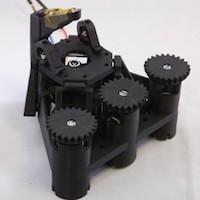
Submitted by Jenny Molloy on Wed, 21/12/2016 - 10:58
WaterScope is a social enterprise making use of an open-source 3D-printed microscope designed by Dr Richard Bowman, who received a SynBio Fund to support his work in 2015. They have been named as one of the Nominet Trust's 100 most inspiring examples of tech for good in 2016.
Nominet Trust, the UK’s leading tech for good funder, recently unveiled the 2016 NT100 - a celebration of the 100 most inspiring social innovations using digital technology to drive social change around the world. WaterScope was named and recognised for their work bringing fast, cheap and reliable water-testing kits to local communities in India and Gambia using a raspberry pi and a 3d printer.
The SRI is proud to have supported development of the microscope used by WaterScope through a £5000 grant from the SynBio Fund and you can check out their project page and outputs here.
The Nominet Trust profile for WaterScope
"We may take drinking water for granted, but the quality of available water supply is unknown in many parts of the world. One tenth of the global population – that’s over half a billion people – do not have access to clean water.
Testing for bacteria is time-consuming and costly. Usually, an outside organisation comes in to do the testing, using heavy equipment worth thousands of pounds. Once a water sample is acquired, the organisation will wait 24 hours to see if certain levels of bacteria develop. It may take days or weeks for the local population to know the results.
A group of staff and students at Cambridge University have found a faster and cheaper way to test water. Led by Dr. Alexander Patto, WaterScope are using Dr Richard Bowman’s affordable 3D-printed digital microscope that delivers results in under two hours. The microscope connects to a Raspberry Pi, but can be used independently of any computer. Anyone can collect a sample of water, which the microscope filters for bacteria. Results are uploaded to a server along with GPS coordinates so they can be shared and archived.
WaterScope has raised over £80,000 of non-dilutive funding to date, and has partnered with Oxfam to bring their testing kits to people who need them the most. They are also selling 3D-printed microscopes on their site to raise more funds. Visit www.waterscope.org for more details"

